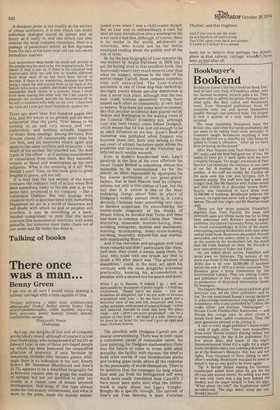Talking of books
There once was a man...
Benny Green
I am not at all sure I would enjoy sharing a railway carriage with a man capable of this:
Thrippy pilliwinx — inkly tinsv pobblebookle abblesquabs? Flosky? Beebul trimble flosky! Okul scratchabibblebongibo, viddle squibble tog-a-tog, ferry moyassity amsky flamsky ramsky damsky crocklefether squiggs.
Flinkywisty Pomm Slushypipp.
As I say, the delights of that sort of company are decidedly mixed, although of course it is true that Slushypipp, who masqueraded all his life as Edward Lear, is one of those privileged people on whom has been bestowed the unqualified affection of posterity, if only because by remaining childlike they became giants. Although there is no indication in the text, Emery Kelen's Mr. Nonsense (Macdonald and Jane's 0.75), appears to be a simplified biography for in-between readers able to grasp the realities of epilepsy but not yet qualified to peer too closely at a classic case of sexual arrested development. Half-biogs of this type always make me feel acutely embarrassed, and what is more to the point, made me acutely embar rassed even when I was a child-reader myself. But as Lear was so extraordinary a case, for once an easy introduction into a woebegone life is not such a bad idea, although, of course, there is no reader in the world, adolescent or otherwise, who would not be far better employed reading about the nobble and.all the rest of them.
By far the best biography of Lear remains the one written by Angus Davidson in 1938, but I got the feeling, even in that excellent book, that there really wasn't very much more to Lear than what we suspect, whereas in the case of his mirror-image Carroll, there remains complexities still unravelled. The Lear-Carroll encounter is one of those dog-that-barked-inthe-night events whose peculiar distinction is that it never took place, although that the two men could, without apparently trying, have missed each other so consistently, is very hard to believe. Was there not some brief encounter, like that peculiar accidental duet played out by Nelson and Wellington in the waiting room of the Colonial Office? Evidently not, although Lear was born twenty years before Dodgson, which means that he was just old enough to be an adult influence on the boy. (Lear's Book of Nonsense was published when Dogson was fourteen years old). Both men belong to that sad court of solitary bachelors upon whom the pruderies and reticences of the Victorian age inflicted such terrible wounds.
Even in Kelen's bowdlerised text, Lear's paralysis in the face of his own affection for sweet Gussie Bethel] is something almost too miserable to be contemplated. As for the theory, so often expounded by apologists for the insane puritanism of our great-grandfathers, that at least Heaven held its compensations, not only is this untrue of Lear, but the fact that it is untrue is one of the most endearing things about him. In place of Dodgson's wobbly pietism there is, in Lear's devoutly Christian heart something very close to derisive scepticism. On encountering the tourist-trade religiosity of the monks of Mount Athos, he decided that Turks and Jews had more in common with Christ than "these muttering, miserable, mutton-hating, manavoiding, misogynic, morose and merrimentmarring, monotoning, many-mule-making, mocking, mournful, minced-fish and marmalade-masticating Monx."
And if the cherubim and seraphim ever read those remarks and didn't particularly like them, well then, they could, it seems, lump them, for Lear, who could with one breath say that to doubt a life after death was "The greatest of absurdities," could, in the next, act upon his certitude with the most delightful irreverent practicality, booking his accomodation in paradise with a shrewd eye for peace and quiet:
When I go to Heaven, if indeed I go — and am surrounded by thousands of polite angels — I shall say courteously, "Please leave me alone: — you are doubtless all delightful, but I do not wish to become acquainted with you; — let me have a park and a beautiful view of sea and hill, mountain and river, valley and plain, with no end of tropical foliage: —a few well behaved cherubs to cook and keep the place clean — and — after I am quite established — say for a million or two years — an angel of a wife. Above all, let there be no hens! No, not one! I give up eggs and roast chicken forever.
The parallels with Dodgson-Carroll are, of course overwhelming. There was in both cases a concurrent career of reasonable talent, for Lear painting, for Dodgson mathematics; there was the failure to come to terms with adult sexuality, the facility with rhymes, the need to build other-worlds of vast Gromboolian plains and looking-glass lands, above all the response to the personality of words themselves. There is no question that the messages for help which Lear sent out from nis beleaguered self were much more easily translated than Carroll's. I have never been quite sure what the Jabberwock is really about, but Lear's YonghyBonghy-Bo is specific enough. The cartoon of Lear's cat Foss dancing is pure Victorian Thurber, and that fragment
And if you voz to see my roziz As is a boom to all men's noziz You'd fall upon your back and scream 0 Lawk! 0 Crickey! it's a dream.
leads me to believe that perhaps the atmosphere in that railway carriage wouldti 't, have been so bad after all.










































 Previous page
Previous page